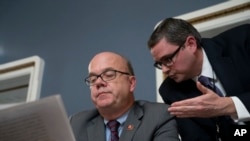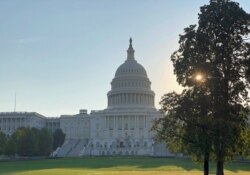Democratic U.S. senators vying for the party’s 2020 presidential nomination face the increasing likelihood of being tethered to Washington for President Donald Trump’s impeachment trial just as they need to ramp up efforts in early-voting states.
With the U.S. House of Representatives set to vote on Thursday on next steps in the impeachment probe, lawmakers there anticipate the investigation could wrap up by year’s end or early 2020, at which point the process will move to the Senate.
Senate Majority Leader Mitch McConnell, a Republican, has said a trial requiring the presence of the full Senate could take place six days a week. That would keep the six Democratic presidential candidates who serve in the chamber off the campaign trail right before the first nominating contests in Iowa and New Hampshire on Feb. 3 and Feb. 11, respectively.
But the timing might not be all bad news. Some Democratic strategists said the White House contenders could benefit from their prominent perch as voters are largely transfixed by the Senate proceedings.
“While the impeachment trial might place some limitations on candidate travel for those who are in the Senate, it also is likely that primary voters and most Americans will be tuned in and watching the trial so senators will be getting a lot of media attention,” said Jim Demers, a longtime Democratic consultant in New Hampshire who supports Senator Cory Booker’s presidential bid.
The last time the Senate held an impeachment trial, of President Bill Clinton in 1998, it lasted five weeks.
The current impeachment inquiry by the Democratic-led House of Representatives is focused on Trump’s request during a July 25 telephone call with Ukrainian President Volodymyr Zelenskiy that he investigate former Vice President Joe Biden, a Democratic political rival, and his son Hunter Biden, who had served on the board of a Ukrainian gas company.
Federal law prohibits candidates from accepting foreign help in an election.
The trial could come at an especially crucial time for Senators Elizabeth Warren of Massachusetts and Bernie Sanders of Vermont. They are battling former Vice President Joe Biden to emerge as the clear front-runner for the nomination, and both senators are positioned to finish near the top in Iowa and New Hampshire.
Senate Republicans view the trial as a potential stumbling block that could bolster other Democratic contenders such as Biden, who will be free to campaign while his rivals have to remain in Washington, one Republican aide told Reuters.
A trial also could complicate the already-struggling presidential bids of Senators Booker, Michael Bennet, Kamala Harris and Amy Klobuchar, who will need the critical stretch before the nominating contests to continue raising money and introducing themselves to voters.
“It’s bad timing for those senators,” said Jeff Link, a Democratic strategist in Iowa who advised Barack Obama’s 2008 presidential campaign. “They all need to find a way to break through the noise and communicate from the trial.”
Asked last week how a trial would affect his campaigning in early states, Booker replied, “I don’t know, and this is going to be very strong words: I don’t care.
“I only have one choice: to do my job, politics be damned,” Booker said.
A ‘HUGE PLATFORM’
Because senators will act as a de-facto jury in an impeachment trial, they will remain mostly silent while on the Senate floor. But nothing will prevent them from speaking to the media when the chamber is not in session.
Jim Manley, once a top aide to former Senate Majority Leader Harry Reid, said that will give the candidates a “huge platform” during the proceedings.
“You can find ways to raise your visibility, whether it’s taking questions in the Capitol or going on TV at night,” Manley said. “It’s going to be wall-to-wall coverage. They’re not going to be suffering from a lack of options to stay visible.”
Those options will include so-called “earned media,” which gets the candidates on televisions across the country without their campaigns having to spend money on advertising.
While campaigns are typically won on the local level, Peter Daou, a Democratic strategist who advised Hillary Clinton’s 2008 presidential campaign, said being part of a “very historic moment” would help the candidates.
“Overall, the message it sends to voters is a net positive for them,” Daou said.
Link said Warren’s strong organization in Iowa may allow her to better withstand an extended absence from the trail.
Warren told reporters in New Hampshire this week that “some things are more important than politics. I took an oath to uphold the Constitution of the United States, and that’s what this impeachment is all about.”
Other campaigns are considering alternative ways to stay connected with voters.
Booker’s team may hold “weekends of action” focused on early-voting states with phone and texting banks. They are also considering having Booker video conference into house parties and record messages for supporters, a campaign aide said.
Candidates may also tap family members, other elected officials or high-profile supporters to campaign in their stead in the weeks ahead of the Iowa caucuses and the New Hampshire primary.
“Plenty of people that will be able to fill in for me, including my husband,” Klobuchar told CNN earlier this month.
“I have a constitutional duty, but I can do two things at once,” she added. “There is more than one way to reach out to people.”








